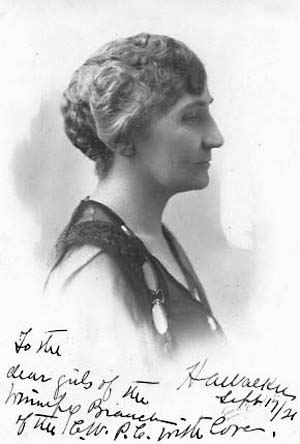Search | Image Archive | Reference | Communities | POV | Lesson Plans | Credits
 C. P. Walker, an American theatre promoter first came to Winnipeg in 1897. He leased the Bijou Opera House on Notre Dame with the intention of adding it to the circuit of theatres in the American mid-west for which he booked touring productions. Walker and his wife Harriet settled in Winnipeg where they became prominent members of the local entertainment and theatrical scene and active members of Winnipeg's emerging middle class political culture.
C. P. Walker, an American theatre promoter first came to Winnipeg in 1897. He leased the Bijou Opera House on Notre Dame with the intention of adding it to the circuit of theatres in the American mid-west for which he booked touring productions. Walker and his wife Harriet settled in Winnipeg where they became prominent members of the local entertainment and theatrical scene and active members of Winnipeg's emerging middle class political culture.
The Bijou, which the Walkers re-named the Winnipeg Theatre, was such a success that by 1907 the Walkers were able to construct a new theatre, this time called the Walker, which was to be Winnipeg's largest hall. The Walker became the favoured venue for theatrical productions, both amateur and professional, music recitals, vaudeville, and politicl meetings and rallies.
Harriet Walker parleyed her role as publicist for the Walker into that of theatre critic, and she was part owner of Town Topics, Winnipeg's weekly society paper until it closed in 1913. Walker was active with the Canadian Women's Press Club, and she also served on the boards of the Winnipeg Children's Hospital and the Humane Society. Through these connections, she became familiar with many of the prominent middle class activists, including other journalists like Francis Beynon and Lillian Beynon Thomas, Nellie McClung, Cora Hind and Fred Dixon, who formed the core of the Political Equality League.
By 1913, Walker was an active member of the League. She was a key organizer of the Women's Parliament in 1914, lending both her venue and her acting talents: both she and her young daugter performed at the spectacle.
Page revised: 27 August 2009